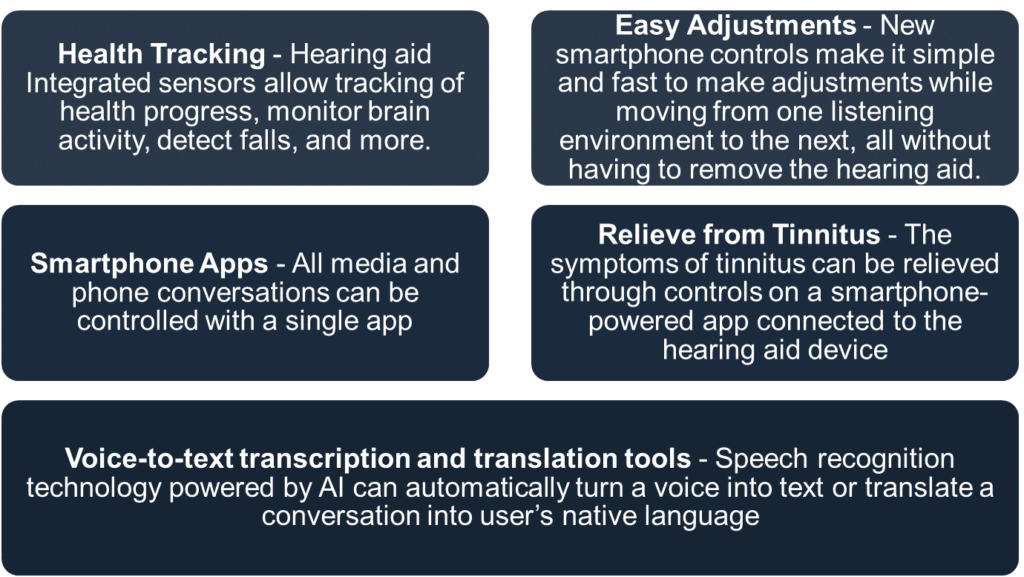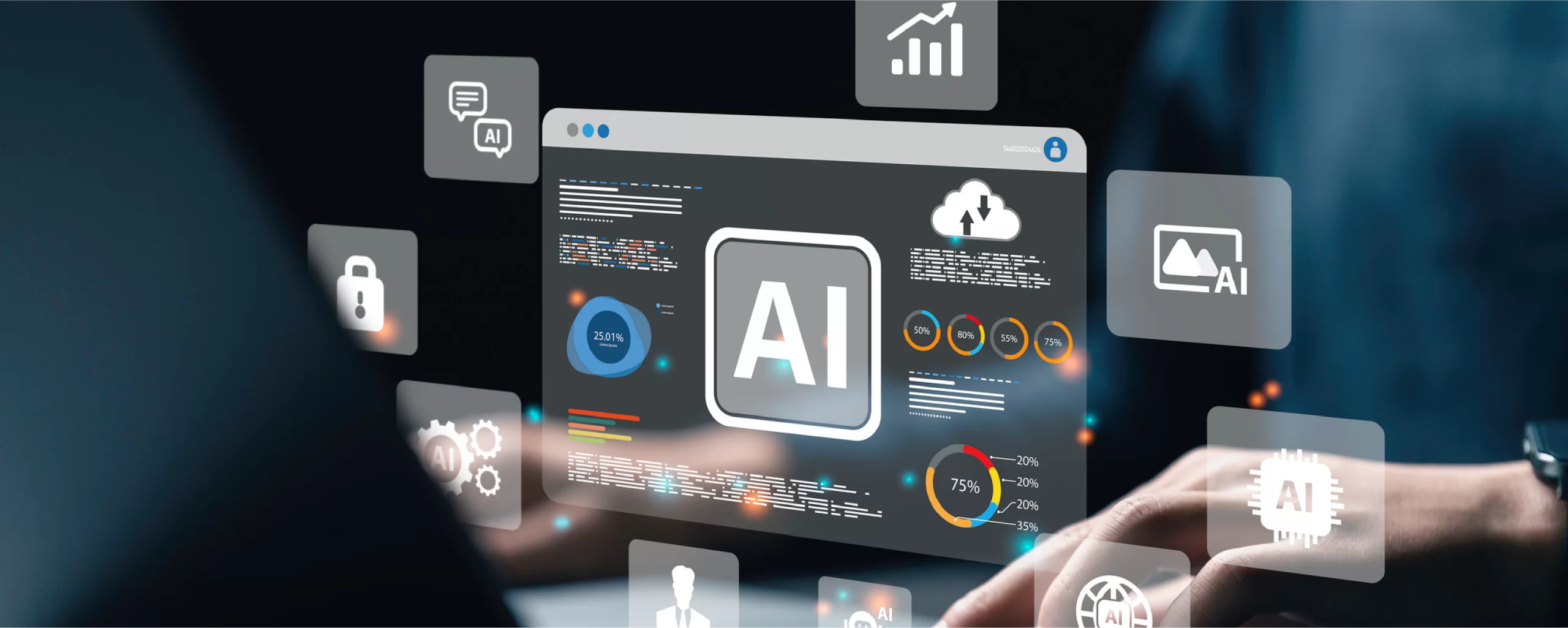AI Hearing Aids: The Game-Changing Solutions
Artificial intelligence (AI) is the driving force behind most of the significant tech shifts over the last several years, but its possible use in hearing aids came into the limelight in 2004. Although AI was yet to be incorporated into a hearing aid at that time, it was slowly introduced with technological improvements. Gradually, AI was employed in various advancements of both hearing aids and cochlear implants, such as trainable hearing aids, voice processing, brain-controlled hearing aids, strategies to improve speech perception in noise, and wind noise management.
The AI-based hearing aid has improved people’s standard of living with hearing impairment. Still, it has also helped to investigate and prevent further deterioration in hearing capacity in the early stage. It also boosts speech sounds to make the sounds clear even to people wearing facemasks, keeping the current scenario of COVID in mind.
What Makes AI Hearing Aids Different From Conventional Hearing Aids?

AI hearing technology is different from traditional hearing aid technology. Instead of a pre-set program, AI hearing aids listen to the millions of sounds the wearer hears each day and learn from them.
- AI hearing aids listen for voices that the wearer hears most often (like the spouse) and prioritize them in crowded places like restaurants and markets.
- AI hearing aids understand the wearer’s usual time spent watching TV and tune into that sound right when the person sits down.
Evolution of Modern Hearing Aids
Hearing aid technology has greatly improved since the weird and wonderful vacuum tube contraptions of the 1800s. Only within the last few decades have a truly transformative wave of fashionable, functional devices started to appear. The revolution started with the first devices of the 1990s and the innovative AI-powered technologies of the present day.
The Livio AI hearing aid was the first company to use integrated sensors and AI to monitor the user’s health in 2019. Through the accompanying Thrive app, Livio AI hearing aids use accelerometers and gyroscopes to track the wearer’s physical and mental health for an overall daily wellness score. These sensors can detect when a fall occurs and send a text message to up to three emergency contacts, and using AI, the range of motion is processed.
Hearing aids became available to purchase over-the-counter (OTC) only in 2017. Currently, the FDA regulates prescription hearing aids, but OTC personal sound amplification products (PSAPs) are unregulated. PFA guidance on OTC hearing aids is yet to be released.
AI-based Hearing Aid Technologies That are Changing the Game
Whisper AI Hearing Aids – Start-up with a new hearing system that gets upgraded over time
The Whisper system comes with a separate box (a “brain”) carried in a pocket or bag. This independent piece of hardware has a lot more technology. The hearing aids can be used without the external “brain,” but the user will not be able to use all the AI benefits.
Whisper uses sophisticated artificial intelligence algorithms and powerful cell phone-level processors to recognize and optimize the sound to deliver a great hearing experience.
Its unique features include:
- Always learning and improving with regular software upgrades
- Advanced sound separation technology
- Ongoing care from a local hearing care professional
Starkey Livio AI – Industry-Leading Fitness Tracking:
This innovative hearing aid was launched in the US in August 2018, followed by the UK in March 2019. The device enables users to take a proactive approach to their hearing and wellness by tracking brain and body activity through its integrated sensors and AI technology. It tracks daily steps, measures movement, and monitors vigorous physical activity. It also monitors the brain health benefits of wearing hearing aids by tracking active listening.
Oticon More – A Hearing aid with a neural net that mimics the brain:
The Oticon More made its debut in late 2020. The company claims Oticon More to be the world’s first hearing aid with an onboard Deep Neural Network that works more like the brain because it learns through experience. This technology helps us understand more “complicated layers” of sound. The DNN screens extract the simple sound elements from a complicated layer of sound and build them together to recognize them. They then balance the sound surroundings to give a clean and ideally balanced hearing.
SoundSense Learn of Widex:
Widex’s AI-powered software helps process inputs from connected hearing aids worldwide and shares anonymized data with a cloud-based AI system. The system then continuously learns how to optimize hearing aid settings further in different situations for specific wearers.
Players with Active IP Filing in the Domain
Some big players working in the arena with IP portfolios include Sonova, Oticon, Knowles, and Starkey.
- Sonova (Founded in 1985), a global leader in Switzerland, deals with innovative hearing care solutions. Sonova has acquired Advanced Bionics, InSound Medical, AudioNova int, Sennheiser, and the most recent acquisition, Alpaca Audiology. Moreover, Sonova Audiological Care has entered an innovative collaboration with Amgen, one of the world’s leading biotechnology companies, to close the diagnosis gap for osteoporosis and hearing loss.
- Oticon (Founded in 1904) is a hearing aid manufacturer based in the United States. ZPower, the world’s only developer of rechargeable, silver-zinc micro batteries, has announced its collaboration with Oticon to make the Internet-connected Oticon Opn™ hearing aid rechargeable.
- Knowles (Founded in 1985), a United States-based company, is a market leader and global provider of advanced micro-acoustic, audio processing, and precision device solutions. These solutions are employed in critical applications in military, medical, electric vehicle, and 5G market segments. Knowles’ state-of-the-art audio signal processing technology is set to collaborate with AIStorm’s patented analog and mixed-signal IP to bring enhanced audio features and power savings to mobile, true wireless stereo (TWS) earbuds and IoT devices.
- Starkey Hearing Technologies (Founded in 1967) is an American privately owned company that makes hearing aids and is one of the largest hearing aid manufacturers in the world. Starkey Hearing Technologies invested in Envoy Medical on Oct 8, 2010. It has a registered patent in the ‘Electric Communication Technique’ category. Starkey has announced a collaborative research study with Standard Medicine to study the use of hearing aids equipped with embedded sensors and artificial intelligence to track and mitigate health risks.
AI Hearing Aids: Startup Companies
A few start-up companies working in the arena with IP portfolio include Olive Union, Telepathy Labs, Yeolrim Co. Ltd, and Beijing Lingtong Technology Co Ltd.
- Olive Union, founded in 2016, is a Japan-based smart-hearing aid start-up that combines cutting-edge technology with intuitive controls, sleek design, and affordable prices to remove existing barriers and reduce stigmas to hearing aid use. Olive Union has raised a total of $17.1M in funding over 3 rounds, the latest of which was raised in April 2021. Olive Union is funded by 5 investors, including its most recent investors, Bonds Investment Group and Japan Finance.
- Telepathy Labs, a US-based startup founded in 2016, delivers interactive voice and chatbot technology to industrial and enterprise markets. Telepathy Labs has raised a total of $24M in funding over 4 rounds. Their latest funding was raised in Aug 2021 from a Venture round.
- Yeolrim Co Ltd is located in South Korea.
- Nanjing Institute of Industry and Technology, founded in 1918, is one of China’s oldest higher vocational colleges.
Recent News/Activities in the Arena
Return of Olive Union with a New, Ambitious Budget-friendly Hearing device – Olive Max
After the success of its Olive Pro 2-in-1 FDA-Registered class II hearing aids in 2020, smart hearing company Olive Union returned with a second and more ambitious product – Olive max 2-in-1 true wireless earbuds and hearing aids. The company announced on 5th April 2022 that it is opening pre-orders. Conventional hearing aids are costly, with one hearing aid costing around $2,000. The Olive Max is only $299 for pre-order customers.
The all-new Olive Max is designed with artificial intelligence that learns and improves the adaptive hearing experience. It uses advanced machine learning technology to customize sound settings to the specific user’s environment automatically.
Fifth Major Update in Whisper’s Flagship Hearing Aid
Whisper announced its fifth upgrade for its flagship product, the Whisper Hearing System. According to the company, the new launch of Whisper’s V1.5 delivers a new feedback cancellation system. Thus, it “improves sound quality and expands the fitting range for the hearing aid to adults with up to 90 dB of hearing loss.” This cancellation system will allow consumers to hear a wider range of sounds without feedback. Moreover, it will help them access more of the customized range set for them.
Future of AI Hearing Aids
Digital hearing aids have traditionally operated with “programs” or “modes.” These static settings are programmed to match up with different environments. However, these programs do not match up to the unique environments or situations.
AI hearing technology is unique, and it takes a different path. Instead of a pre-set program, AI hearing aids listen to the millions of sounds one hears daily and learn. AI hearing aids are learning to track blood pressure, notify close ones in case of a fall, and track activity. Also, they can even help predict and prevent early signs of dementia. Therefore, experts say that the ear is now the new wrist. According to professionals, Bluetooth will become a common element in future hearing aids. This will happen after Apple patents specific Bluetooth technology for hearing aids that connect to the iOS platform.
Conclusion
The latest devices in the market are shifting from basic medical instruments to complex digital assistants. Therefore, people with hearing aids in the future will become superheroes with futuristic sci-fi characteristics. Big tech giants like Google are also evolving the AI and digital assistant game by creating a system that may soon be able to isolate a speech signal among the multitude of other voices and background noises. This will allow people with hearing loss to hear someone speaking to them much more clearly, regardless of the environment. We might also see hearing aids connected to the World Wide Web without needing a smartphone. Hearing aids might just convert to a healthcare device that people with full hearing would also be using. Keeping in mind the aim of sustainability, companies are creating ways to allow these devices to work using only body heat of kinetic power in the future.



